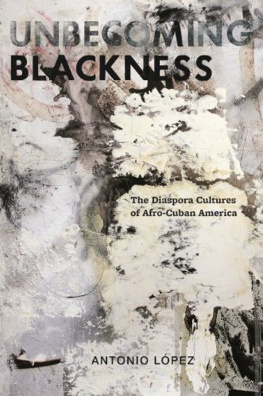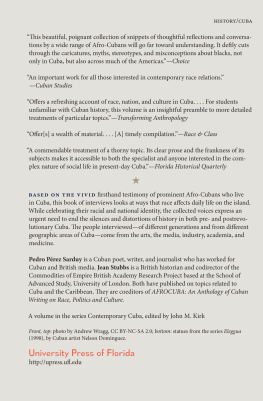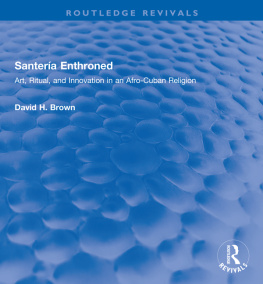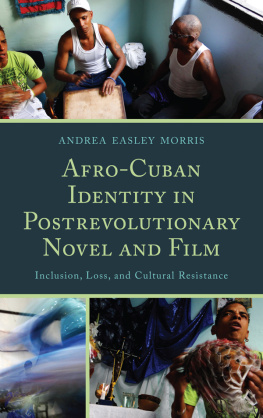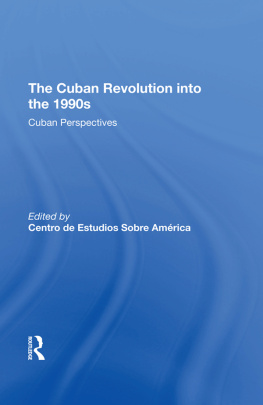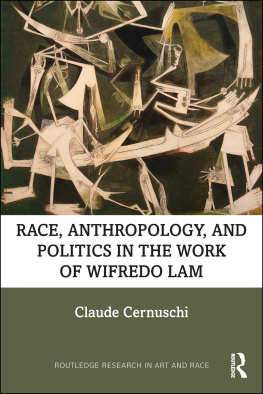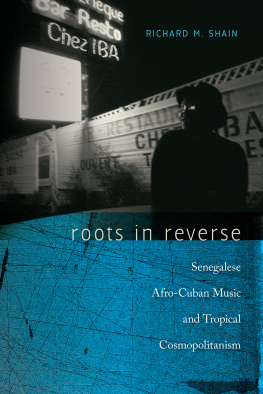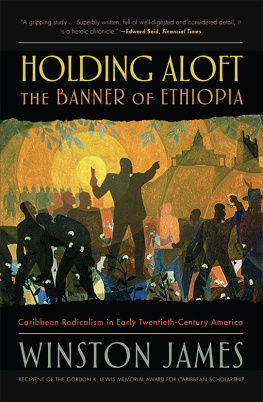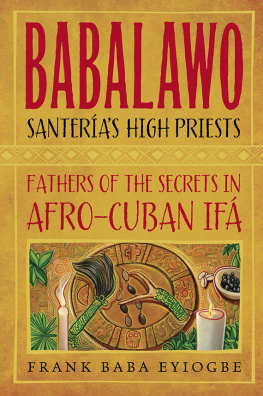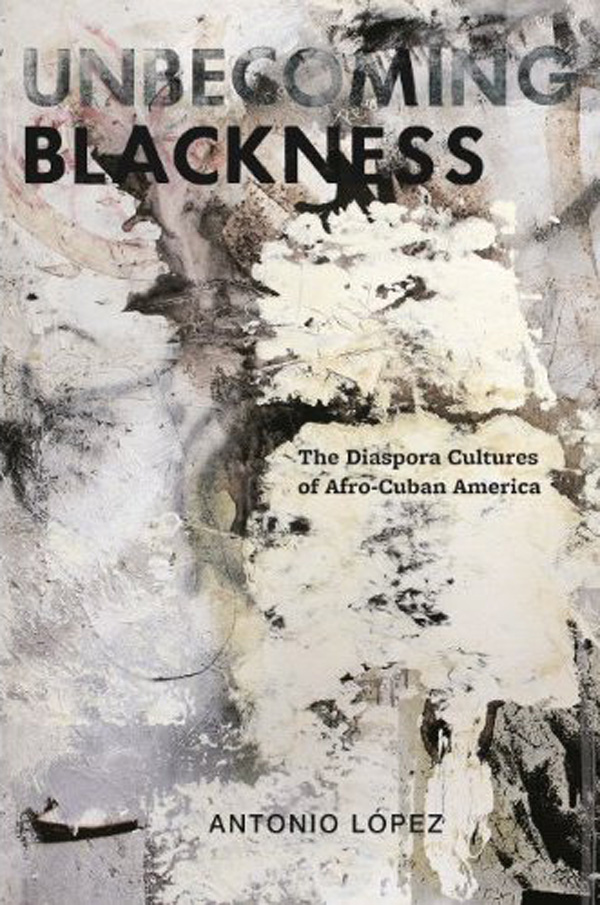Unbecoming Blackness
The Diaspora Cultures of Afro-Cuban America
Antonio Lpez
New York University Press
New York and London
New York University Press
New York and London
www.nyupress.org
2012 by New York University. All rights reserved
Library of Congress Cataloging-in-Publication Data
Lpez, Antonio M.
Unbecoming blackness : the diaspora cultures of Afro-Cuban America / Antonio Lpez.
p. cm.
Includes bibliographical references and index.
ISBN 978-0-8147-6546-3 (cl : alk. paper)
ISBN 978-0-8147-6547-0 (pb : alk. paper)
ISBN 978-0-8147-6548-7 (ebook)
ISBN 978-0-8147-6549-4 (ebook)
1. Cuban AmericansIntellectual life20th century. 2. Cuban AmericansEthnic identity 3. BlacksUnited StatesIntellectual life20th century.4. African AmericansIntellectual life20th century. 5. American literatureCuban American authors. I. Title.
E184.C97L67 2012
305.8968'7291073dc23
2012009413
References to Internet websites (URLs) were accurate at the time of writing. Neither the author nor New York University Press is responsible for URLs that may have expired or changed since the manuscript was prepared.
A book in the American Literatures Initiative (ALI), a collaborative publishing project of NYU Press, Fordham University Press, Rutgers University Press, Temple University Press, and the University of Virginia Press. The Initiative is supported by The Andrew W. Mellon Foundation. For more information, please visit www.americanliteratures.org.
To my mother and brother
To Rachel and Maeve
Contents
This book hardly resembles the project I began while in the English Department at Rutgers University, but the confidence John McClure, Brent Edwards, and Bruce Robbins showed in me then has encouraged me ever since. I began researching and writing these pages when I arrived at the George Washington University in 2005, and, since then, I have benefited from the support of Dean William Frawley, Dean Peg Barratt, and Associate Dean Geralyn Schulz. A Junior Scholar Incentive Award and a University Facilitating Fund Award allowed visits to libraries and archives that proved indispensible. The backing of my fellow members of the English Department has been remarkablein particular, Marshall Alcorn, Hache Carrillo, Patty Chu, Jeffrey Cohen, Holly Dugan, Jonathan Gil Harris, Connie Kibler, Faye Moskowitz, Ormond Seavey, Chris Sten, Linda Terry, and Gayle Wald. Robert McRuer made it his duty to guide me toward publication. Of special significance are my department comrades Jim Miller and Jennifer James, who offered friendship and mentorship throughout. Elizabeth Acevedo, Ricardo Almonte, Kathryn Bibler, Jonathan Chuck, Zak McAdoo, Hilary Moise, Alexandra Moss (who helped research chapter 4), Amanda Nazario, Dennis Perales, Andrew Ratner, Tess Salazar, Trinh Tran, Sonia Valencia, and Laura Warman are on a long list of people I have had the pleasure to teach as this book emerged.
At New York University Press, Eric Zinner demonstrated his commitment from the start. Ciara McLaughlin led me through the review and production stages expertly. I also thank NYUs readers, whose feedback made this so much better.
I appreciate my longtime friends, near and far: Gwen Bradley, Anand Commissiong, Ariel Fernndez, Bill de Grummond, Chris Hollingsworth, Luis Iglesias, Thomas Meal, Debra Roy, and Yesenia Selier. The first few years in the District would have been impossible without Lisa Lynch, who brought the Brooklyn, and Tommy Castillo, the Hialeah. Ian Goulston has been a great influence. Talking to him about music and filmcollaborating with himwas one of the pleasures of this experience. I am also thankful for the generosity of the families in Miami, Boston, and Los Angeles: Emiko Lpez, Irene Canel-Petersen, Mary McLaughlin, John McLaughlin, Mary Carol McLaughlin, Kaitlin McLaughlin, and Jenny Pearson.
I am grateful to the many people who offered me contacts, sources, and other assistance, including Al Angeloro, Donna Arnold, Mario Barrera, Esteban Luis Crdenas, Michael Casey, Yasnay Cuesta, Margaret Dakin, Cristobal Daz Ayala, Jos Daz Rodrguez, Marvin Dunn, Jorge Florido, Marilyn Graf, Judge Evelio Grillo, Jr., Pedro Juan Hernndez, Leah Jehan, Miriam Jimnez Romn, Nicols Kanellos, Jeff Lemlich, Marquis Lewis, Joseph McNair, Ignacio Mireles Rangel, Lucio Ortigoza, Enrique Patterson, Luis de la Paz, Michael Pounds, Toms Fernndez Robaina, Harold Lee Rush, Manolo Salvat, Jos Snchez-Boudy, Nicole Smith, Pam Sporn, Lesbia Varona, Eduardo de la Vega Alfaro, Tony Vlez, and Neva Wartell. Colleagues, many of them friends, offered comments and provided venues for presentation and publication at various stages, including Mnica Ayala, Roberto Fernndez, Juan Flores, Jorge Gracia, Ted Henken, Keith Leonard, Iraida Lpez, Manuel Martnez, Suzanne Oboler, and Randy Ontiveros. I especially appreciate Isabel lvarez-Borland, Jos Buscaglia-Salgado, Robert Dickson, Ral Fernndez, Rodrigo Lazo, Nancy Mirabal, and Jos Esteban Muoz for taking such a strong interest in the work. Ricardo Ortiz, with whom I have been fortunate to share a neighborhood in the District, has been a true advocate and friend; he has led the way for many in Cuban American literary and cultural studies, me included. I greatly value the trust Diana Lachatanere showed in me as I wrote about her mother and father and the many comments she contributed over the past several years. My use of the Rmulo Lachataer papers and photographs, without which a large part of this book would not exist, comes courtesy of her. I also thank Jos Parl for allowing the reproduction of Aguada de Pasajeros.
One of the most rewarding aspects was getting to know the elders: the people whose lives stretched back as far as the 1930s, when, as young men and women, they lived many of the events I describe. It was an honor to talk to Graciela, Melba Alvarado, Ren Buch, Pupi Campo, Eileen Charbo, Diosa Costello, Evelio Grillo, Simn Jou, Jr., Rosendo Rosell, Max Salazar, and Zoraida Valds-Holmes.
My mother, Pilar, took care of us in every way, and my brother, Miguel, made me laugh and chill. Anything Cuban American will always begin with them. No one has dedicated more of herself to make this book come true than Rachel McLaughlin. And, even then, she gave still more: to me, a second chance. Our daughter, Maeve, made everything happier. This is for the four of them.
Parts of chapter 5 previously appeared in Cosa de Blancos: Cuban-American Whiteness and the Afro-Cuban-Occupied House, Latino Studies 8.2 (Summer 2010): 22043.
In Africa (Fu en el frica), written by Eusebia Cosme, English lyric by Marion Sunshine, arranged by Anselmo Sacasas, 1945 (Renewed 1973, 2001) Fred Ahlert Music Group (ASCAP)/Administered by Bug Music and Antobal Music Company, all rights reserved. Used by permission. Reprinted by permission of Hal Leonard Corporation.
One afternoon late in 1929, two Afro-Cuban men visited the Havana home of an Afro-Cuban woman to conduct an interview for a newspaper article. Nicols Guilln was already known for his journalism and was on the way to becoming a renowned poet. His companion, Gustavo Urrutia, was a prominent figure in Afro-Cuban social and intellectual life as the editor of Ideales de una Raza (Ideals of a Race), a Sunday page on Afro-Cuban topics in El Diario de la Marina. Guilln published the interview in Ideales as Seorita Consuelo Serra, a title that revealed to readers his interviewees connection to Cuban history: Consuelo Serra was the daughter of Rafael Serra, the famous journalist and Cuban independence leader in the United States during the late nineteenth century.

